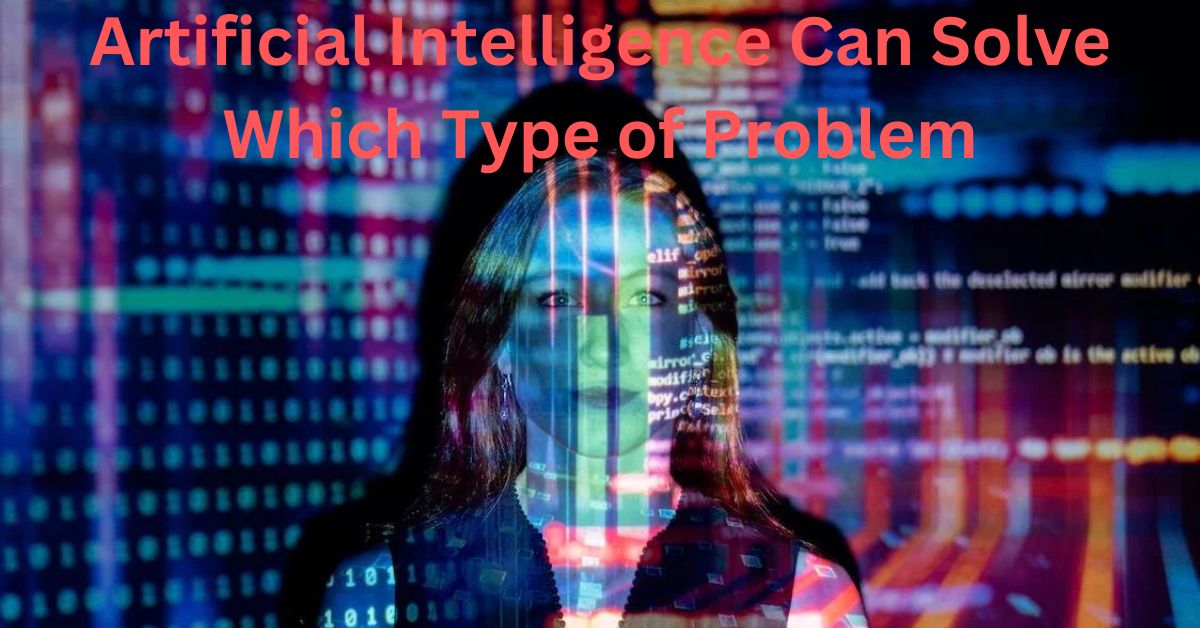Artificial Intelligence Can Solve Which Type of Problem 2024
Artificial Intelligence Can Solve Which Type of Problem Artificial Intelligence (AI) has emerged as a transformative technology with the potential to revolutionize problem-solving across various domains. From healthcare to finance, AI offers a myriad of solutions to complex problems. In this article, we delve into the types of problems AI can effectively address, its applications, challenges, and future prospects.
Introduction to Artificial Intelligence (AI)
Artificial Intelligence, often abbreviated as AI, refers to the simulation of human intelligence in machines programmed to think and learn like humans. It encompasses a range of techniques such as machine learning, natural language processing, and computer vision to analyze vast amounts of data, recognize patterns, and make decisions with minimal human intervention. The significance of AI lies in its ability to solve problems efficiently and accurately.
Types of Problems AI Can Solve

Classification Problems
AI excels in classifying data into predefined categories based on its features. For instance, in healthcare, AI can classify medical images to detect diseases like cancer or identify spam emails in cybersecurity.
Regression Problems
Regression analysis is a statistical technique used to predict the relationship between variables. AI algorithms can analyze historical data to make forecasts and predictions, such as stock prices or customer demand.
Natural Language Processing (NLP)
NLP enables computers to understand, interpret, and generate human language. AI-powered chatbots and virtual assistants like Siri and Alexa leverage NLP to communicate with users, answer queries, and perform tasks.
Image Recognition
AI algorithms can analyze visual data to recognize objects, faces, and patterns. This capability finds applications in surveillance, autonomous vehicles, and quality control in manufacturing.
Optimization Problems
AI algorithms optimize complex systems to achieve the best possible outcome. From route optimization in logistics to resource allocation in energy management, AI enhances efficiency and productivity.
Pattern Recognition
AI excels in identifying patterns and anomalies in data that may not be apparent to humans. This capability is invaluable in fraud detection, predictive maintenance, and scientific research.
Artificial Intelligence Can Solve Which Type of Problem

AI’s problem-solving prowess is evident across diverse sectors:
Healthcare
AI aids in diagnosis, drug discovery, personalized treatment plans, and medical imaging analysis, improving patient outcomes and healthcare delivery.
Finance
AI algorithms analyze market trends, detect fraudulent transactions, automate trading, and offer personalized financial advice, enhancing decision-making in the finance industry.
Marketing
AI optimizes marketing campaigns, segments customers, predicts buying behavior, and delivers personalized recommendations, increasing customer engagement and ROI.
Transportation
AI powers autonomous vehicles, traffic management systems, predictive maintenance, and route optimization, revolutionizing transportation efficiency and safety.
Education
AI personalizes learning experiences, provides adaptive tutoring, automates administrative tasks, and improves educational outcomes through data-driven insights.
Challenges and Limitations of AI
Despite its potential, AI poses certain challenges:
Ethical concerns
AI raises ethical dilemmas regarding privacy, bias, accountability, and job displacement, necessitating ethical frameworks and regulations.
Bias in AI algorithms
AI algorithms may exhibit biases inherited from training data, leading to unfair outcomes and discrimination, requiring mitigation strategies and diversity in datasets.
Overreliance on AI
Overreliance on AI without human oversight can lead to errors, loss of control, and unintended consequences, underscoring the importance of human-AI collaboration.
Complexity of some problems
AI may struggle with highly complex, ambiguous, or ill-defined problems that require contextual understanding and human judgment, highlighting the need for interdisciplinary approaches.
Future Prospects of AI in Problem-Solving
Despite challenges, AI holds immense promise for the future:
Advancements in AI technology
Ongoing research and development in AI promise breakthroughs in problem-solving capabilities, pushing the boundaries of what AI can achieve.
Integration with other technologies
AI will increasingly integrate with emerging technologies like quantum computing, blockchain, and IoT, unlocking new possibilities for problem-solving across domains.
Ethical considerations and regulations
Addressing ethical concerns and establishing regulatory frameworks will foster responsible AI deployment, ensuring its benefits are realized while mitigating risks.
Conclusion
In conclusion, artificial intelligence is a powerful tool for solving a wide range of problems across industries. From classification and regression to natural language processing and image recognition, AI’s capabilities continue to expand, offering innovative solutions to complex challenges. However, ethical considerations, bias mitigation, and human-AI collaboration are crucial for realizing the full potential of AI in problem-solving.
FAQs
- Can AI solve all types of problems? While AI is proficient in solving many types of problems, there are limitations, especially with highly complex or ambiguous tasks that require human judgment.
- How does AI handle bias in algorithms? AI bias can be mitigated through diverse and representative training data, algorithmic transparency, and ongoing monitoring and evaluation.
- What are some examples of AI applications in healthcare? AI applications in healthcare include medical imaging analysis, predictive analytics for disease diagnosis, drug discovery, and personalized treatment plans.
- Is there a risk of job displacement due to AI? While AI may automate certain tasks, it also creates new job opportunities in AI development, data science, and human-AI collaboration roles.
- What are the key considerations for responsible AI deployment? Responsible AI deployment requires ethical frameworks, transparency, accountability, and ongoing evaluation of AI systems’ impact on society.





